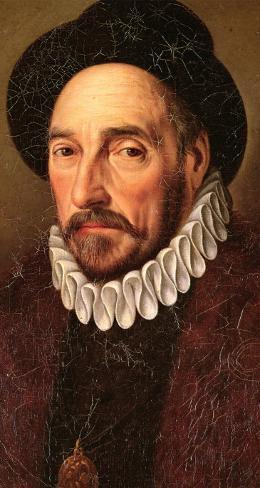
In the collected Essays, that masterpiece of self-analysis, the 16th century French essays Michel Eyquem de Montaigne began as a stoic and ended as a skeptic. The more carefully he pursued knowledge, the less he knew.
Continue reading Montaigne
In the collected Essays, that masterpiece of self-analysis, the 16th century French essays Michel Eyquem de Montaigne began as a stoic and ended as a skeptic. The more carefully he pursued knowledge, the less he knew.
Continue reading Montaigne
As one of the most cynical thinkers of all-time, Machiavelli is remembered as the philosopher of realpolitik, or the politics of power. His detached, viciously candid investigation of power, The Prince (1517) was published five years after his death. His goal for the work was to “write something of use to those who understand… the real truth of the matter to its imagination.”
Continue reading Machiavelli
Discontent with the increasing wealth and unchecked corruption of the Roman Catholic church helped to interrupt and eventually break down the stagnant worldview of the Dark Ages, and the long slumber of free inquiry slowly began to end. For the first time in a thousand years, investigations into the nature of things could be directed without clerical tampering and the threat of heresy.
Continue reading Nihil Sub Sole Novum*
A key element of Aztec philosophy was duality: in Aztec poetry and the noble-dialect of Nahuatl, figure of speech and symbolic metaphors were based on paired words that were often contradictory such as “Water Fire,” which meant war. Quetzalcoatl, the chief Aztec god, was described by the duality between the mundane (earth, snakes) and the divine (sky, birds).
Continue reading A Crack of Light Between Two Nothings
In 314, the Emperor Constantine’s Edict of Milan assured the Christian hegemony over several competitors. You’d think the anxieties and melancholia present during the Roman Empire’s decline would be partially alleviated with the official sanction of Christianity. Hardly!
Continue reading Apropos of Nothing
Lucius Annaeus Seneca, one of Rome’s most famous philosophers spent a large part of his life trying to convince his student Nero the finer points of being a Stoic-flavored philosopher-king. While he did demonstrate unselfish nobility in his writings, his life was rife with greed, made base with expediency, and plagued with conspiracies. Continue reading Seneca
Not only was Lucretius my all-time favorite Roman philosopher, he was also the greatest of philosophical poets who lived through one of the most anarchic periods in Roman history: a time of dictatorship, civil war, and conspiracies. No one was safe from this world. Continue reading Lucretius

During its thousand year history, the Roman empire increased to a point where it encompassed virtually all of the known world. The most fascinating thing about the Roman civilization? Not its imperialist expansion, but that tortuous, strung-out slide to ruin. Why Rome fell is one of the great questions of history. Although the Romans seemed motivated by an industrious, if tedious pragmatism, we can also discern a widespread fatalistic resignation. Continue reading Nihil Perpetuum Est*

The Hebrew scriptures detail the creation of human beings and their relationship with the Creator. The first people, Adam and Eve committed an indiscretion that cursed the entire species a life filled with toil, pain and sorrow. Continue reading Null and Void

The hallmark of the Hellenistic era was chaos due to the deteriorating political influence of the city states and countless ruinous wars among autocratic rulers. That Tyche, the mercurial goddess of chance, was highly venerated everywhere, clearly indicates the instability of the time. Hellenistic people were deeply cognizant of the omnipresence of contingency in their lives.